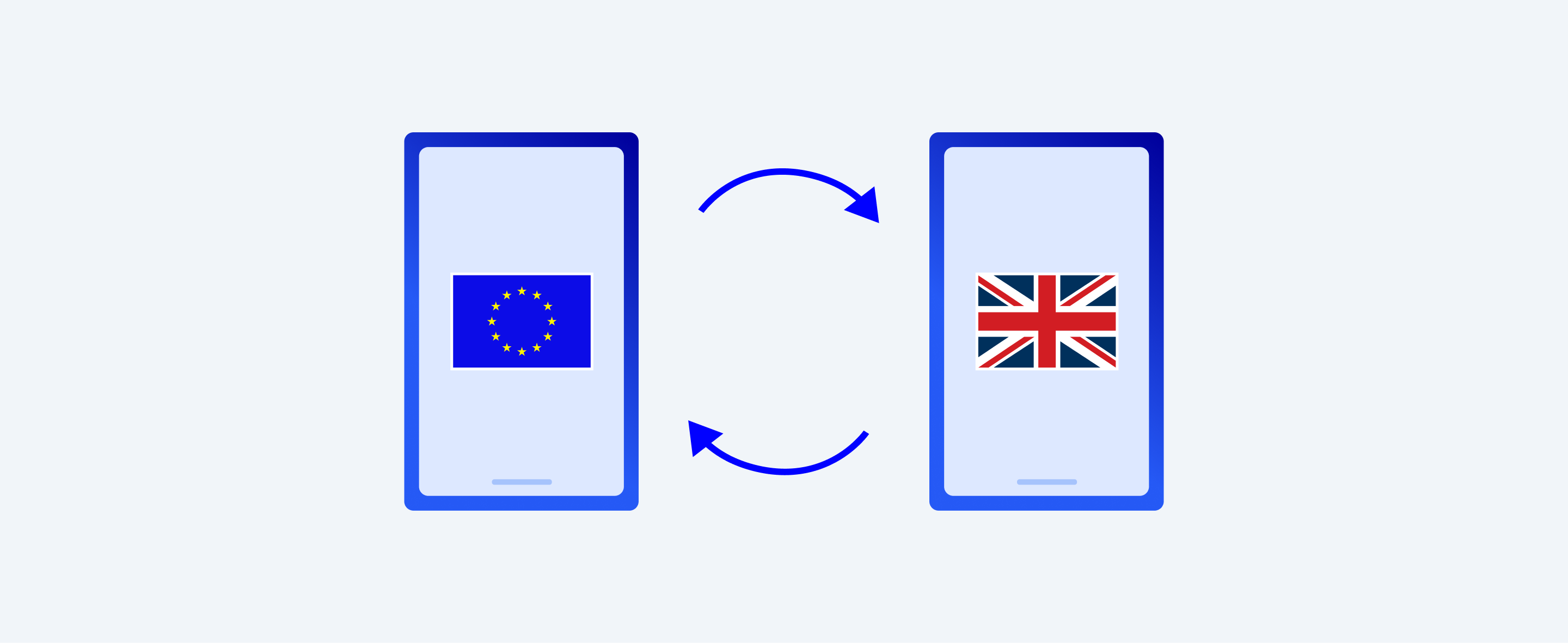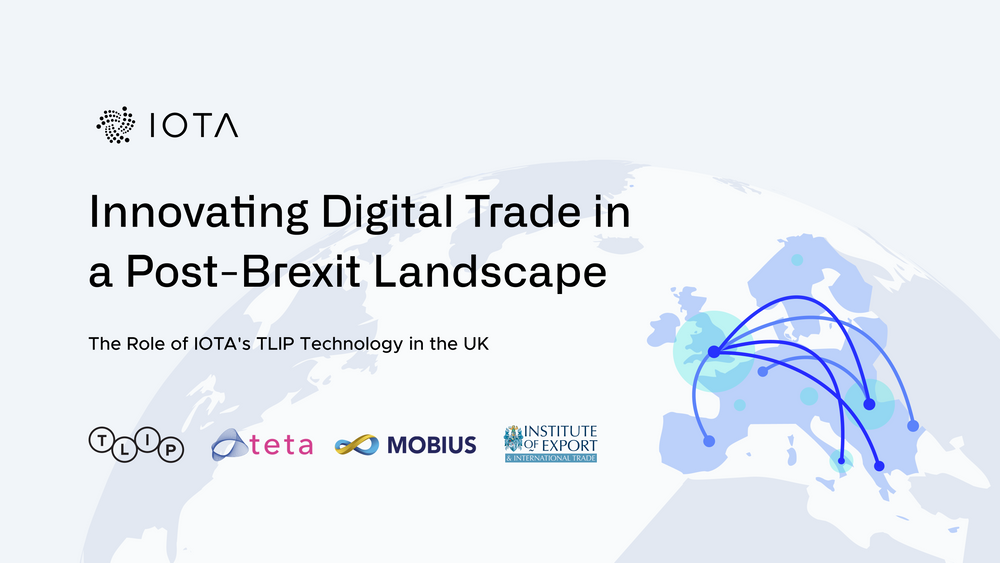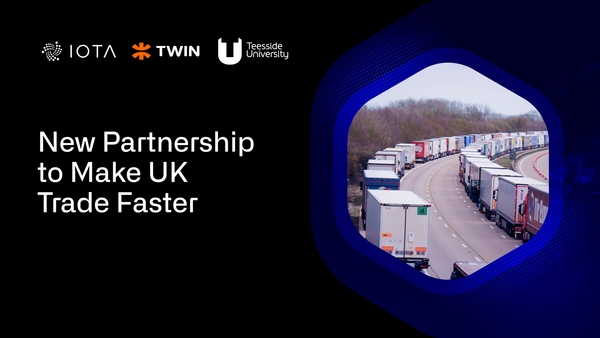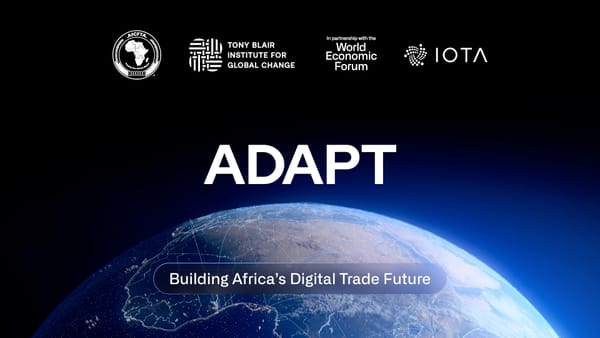Innovating Digital Trade in a Post-Brexit Landscape
The Role of IOTA's TLIP Technology in the UK
TL;DR:
The Trade and Logistics Information Pipeline (TLIP), utilizing IOTA technology, aims to streamline EU-UK trade by enabling real-time data sharing and reducing administrative overhead. A pilot study with Mobius Technology shows TLIP's potential in enhancing efficiency and compliance, particularly for perishable goods. TLIP promotes interoperability and trust, promising a more efficient and compliant trade process.
When the UK left the EU customs union, single market, and VAT area in January 2021, the opportunity arose for the UK to create one of the world’s most advanced digital trade borders. Faced with a significant increase in the administrative and regulatory requirements for moving goods between the UK and the EU, both sides are developing ways of managing the new complexities of trade administration efficiently. The UK’s Electronic Trade Documents Act enables legal recognition of electronic forms of trade documents, while the EU’s Entry & Exit System will digitize border crossings by non-EU nationals.
With £450 billion in goods imported into the UK from the EU in 2023, advancements in digital trade infrastructure are crucial to simplify the regulatory environment and optimize trade procedures. Advanced technologies such as the IOTA-based Trade and Logistics Information Pipeline (TLIP) provide the ideal independent infrastructure to build digital trade solutions to improve the flow and efficiency of trade between the UK and the EU.
TLIP: Streamlining Trade Through Technology
As an open-source independent digital infrastructure that connects digital innovation from market providers, TLIP offers a solution to EU-UK trade challenges.
TLIP uses IOTA to create a seamless digital network for managing trade information and facilitating real-time data sharing across supply chain and government border agency stakeholders. This reduces administrative overhead and streamlines trade, addressing the challenges of dealing with multiple organizations and the high costs associated with document verification. A typical trade consignment can involve over 20 organizations, from exporters and importers to customs brokers and insurance companies. Each organization typically exchanges information in the form of PDFs, with each incurring costs for extracting and reentering data and manually checking documents.

TLIP enables stakeholders to access and share consignment data seamlessly, reducing delays and the risk of non-compliance penalties. It supports compliance with rigorous Environmental, Social, and Governance (ESG) standards and integrates audit processes to uphold high-quality standards.
Case Study: Poultry Consignments
In the UK, TLIP’s benefits are being tested in a pilot study involving the shipment of poultry from Poland to the UK, managed by the Chartered Institute of Export & International Trade and Mobius Technology, a specialist technology freight forwarder specializing in chilled and frozen food supply chains.
Mobius handles subcontracts for hauliers to collect and deliver consignments, creates export and import declarations from supply chain documentation and health certificates, and arranges shipping through ports of exit and entry. It captures all relevant supply chain documents in its online platform and monitors the physical movement of goods with GPS and environment sensors.
However, physical checks by border officials, who have to compare the declaration information against the consignment, can cause delays, particularly if the correct paperwork isn’t provided by the driver or is just missing. This is particularly problematic for perishable goods prone to spoilage, which includes chilled chicken, which if delayed too long will be downgraded to pet food at a reduced value and loss to the supplier.
How Mobius Uses TLIP
In the pilot study, Mobius has selected six consignments per day to send signals to inform and pre-notify border agencies including port health about each consignment’s details, including route and timings, consignment information, and expected port arrival, while monitoring temperature control and location throughout the transport journey. This proactive approach ensures that all regulatory requirements are checked before the goods reach the border, enabling border agencies and health officials to expedite the clearance process and reduce the potential for costly delays.
TLIP acts as a ‘digital pipeline’ that collates consignment and transport information for each shipment, making it accessible to relevant stakeholders who have permission to view the data. This provides two key benefits: Interoperability and trust.
Benefit 1: Interoperability
Transport and logistic companies and freight forwarders each have their own IT systems to manage their complex supply chain operations for their clients. The huge number of organizations operating in the international supply chain makes it impossible to connect all systems to each other and enable the digital sharing of supply chain data. In contrast, TLIP is an open-source platform to which supply chain participants can connect via APIs. By using international data standards, TLIP facilitates interoperability between a multitude of different IT systems. Documents and data are stored in one place - usually the owner’s IT systems - and remain under the control and ownership of the original author while being accessible through TLIP. These documents and data items can be shared, compared, and accessed by different parties from different points along the supply chain. This promotes consistency and administrative efficiency in supply chains.
Benefit 2: Trust
TLIP ensures trust in both supply chain participants and the data itself.
All participants in TLIP are carefully audited and accredited, with credentials stored as Verifiable Credentials in their digital identity wallets. For example, a farmer’s license to trade, VAT and registration details, veterinary and medical checks, and compliance with fertilizer and feed standards of their local jurisdiction are stored in their wallet on TLIP. Therefore, their identity is verified by these trusted credentials and when they publish documents and data, this identity is assigned to those documents, enabling provenance to be easily checked.
In the Mobius pilot, each signal’s data is sent to an information-sharing network facilitated by the UK Cabinet Office, which then sends it on to the Port Health Authority and other government border agencies. The data is tokenized and its ownership is linked to the original sender with a digital signature. At any point in the supply chain, a border authority official can look at TLIP (on the IOTA ledger) and view a wealth of supply chain information, confirm to whom the data belongs, and when and where it originates. Especially as ESG demands increase, the need to prove the Origin of Provenance becomes increasingly valuable.
TLIP’s trusted data and participants could reduce the volume of costly resource-intensive document checks performed by border authorities and port health officials at ports of entry – instead, these compliance checks are baked into the supply chain itself.
Collaboration with TETA
Mobius is a member of the Technology-Enabled Trading Alliance (TETA), whose primary mission is to address and resolve complex trade issues related to the movement of goods across international borders, with a particular focus on exports from the UK and imports into the UK. Dedicated to redefining international trade through advanced technology and expertise, TETA collaborates with industry leaders like Mobius, alongside food authentication specialists and supply chain monitoring tech firms to streamline processes for a more efficient global trade network.
By working with TETA, TLIP benefits from real-world testing and implementation, ensuring practical and effective solutions for actual trading scenarios.
Next Steps
The TLIP-Mobius partnership will continue to develop the ‘signals’ concept and introduce new operational signals to include results from health inspections, dispatch and port arrival times, environmental monitoring alerts, and more. The pilot is scheduled to run until the end of September aligning with the current UK Cabinet Office project timeline. Post-pilot, the initiative intends to develop the first commercial EU-UK road freight platform and to extend collaboration to include integration with port operators (CSPs) and sea carriers.
Conclusion
As the UK navigates its post-Brexit trading relationship with the EU, the innovative role of technologies like TLIP can’t be overstated. According to Jens Munch Lund-Nielsen, Head of Global Trade & Supply Chains at IOTA Foundation, “By cutting through the complex web of international trade logistics, TLIP not only enhances operational efficiencies but also provides access to trusted supply chain data to support and even automate checks on compliance with evolving standards and regulations.”
As we move towards a more digital trade environment, DLT-based technologies like TLIP stand at the forefront, promising a more streamlined, compliant, and efficient trade process across borders. Follow TLIP on LinkedIn and X (formerly Twitter) to stay tuned for future integrations.




